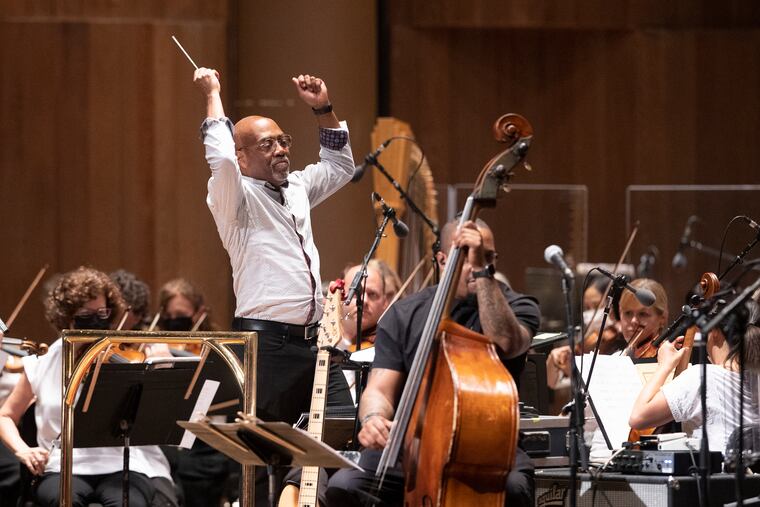At Verizon Hall, Hilary Hahn wows with double encores
The phenomenal William Eddins works the baton and the Philadelphia Orchestra plays its first Coleridge-Taylor Perkinson.

Philadelphia loves a hometown hero. Hilary Hahn, the Curtis-trained one-time wunderkind who now has a blue-chip career, surely qualifies. The violinist was the draw for many in Thursday’s sizable Verizon Hall crowd.
But the more significant artistic news in the program (to be repeated this weekend) was the arrival of William Eddins, who led a La Mer of astonishing detail and power. The gathering winds and sea built upon each other, at the end of the piece, with such enveloping beauty and inevitability, that the eyes welled up with something more significant than sea mist. Artistic triumphs can do that.
From a certain perspective, Eddins has slipped quietly onto the orchestra’s podium. After a few earlier dates, he was at the Mann this summer in a Nina Simone tribute with vocalist Ledisi, and then in Saratoga Springs, N.Y., with the orchestra for three programs.
Thursday marked the conductor’s subscription-concert debut, an increasingly outmoded but still prestigious notch in classical music’s odd ranking system. The repertoire was formidable. Eddins had a sympathetic and even convincing response to Hahn’s enervating tendencies in the Tchaikovsky Violin Concerto.
Eddins, 57, former music director of the Edmonton Symphony Orchestra, also led a surprise: the orchestra’s first performance of anything by Coleridge-Taylor Perkinson — his Sinfonietta No. 1.
A pianist, jazz artist, conductor, and composer, Perkinson spanned worlds: He was one of the founders, in 1965, of New York’s Symphony of the New World, often referred to as the first racially integrated orchestra in the U.S., and he wrote and conducted the score to the Sidney Poitier film A Warm December.
There’s a lot that’s striking about Perkinson’s piece. Most notably: If an orchestra today commissioned a young composer to write a new work and Perkinson’s Sinfonietta No. 1 was the resulting sound, no one would suspect its age — that’s how contemporary the musical language is. It’s from 1955, the music of a self-assured composer: muscular, finely crafted, and fabricated through interfolding layers whose clear definition fell comfortably into the hands of this orchestra’s strings.
Hahn has a lovely sound. Her richness in the two encores — the “Sarabande” from Bach’s Violin Partita No. 2 in D Minor, BWV 1004, and the “Gigue” from the Partita No. 3 in E major, BWV 1006.1 — came across even more beautifully in person than in her recordings. She has a marvelous way of reducing sound to a delicate tracery. Bach seems almost humble and vulnerable in spots.
With the Tchaikovsky, she tried to create interior moments in the first movement by slowing considerably and creating distinct subsections. To me they seemed disconnected from the rest of the movement. In the concerto’s second movement, Hahn and clarinetist Samuel Caviezel were locked in a contest to see who could play more quietly. I think he won.
Eddins shedded the physical score in this performance of La Mer, conducting from memory. It may seem like a small thing, but by landing on just the right tempo (and there are many in this piece), Eddins built out Debussy’s specific imagery. The radiant moment the sun comes out near the end of the first movement (“From Dawn to Midday at Sea”) was particularly moving.
Eddins never let the orchestra wallow in its own sound. But what sounds! Oboist Philippe Tondre’s tone vibrated with life, harps were glints of light, and the orchestra’s cello section sounded more velvety and unified than it has in some time. Conductors ask for and do specific things in rehearsals. But one elusive element in the ensemble-conductor dynamic is how persuaded players are by the conductor, and with Eddins, this orchestra sounded all in.
Additional performances: Friday at 2 p.m. and Saturday at 8 p.m. in Verizon Hall, Broad and Spruce Sts. Tickets are $10-$168. philorch.org, 215-893-1999.